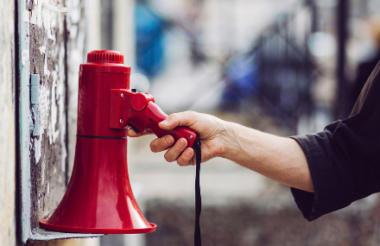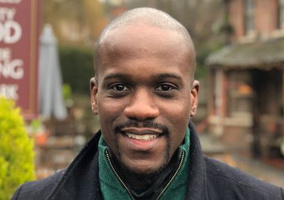In recent years, I have increasingly found myself having conversations about the relative absence of charity CEOs in public discourse. The actual work that charities do is regularly covered, and charities are frequently cited as sources of evidence - in fact more and more, it seems, as social pressures grow (a recent episode of Dispatches looking at the experience of children growing up in poverty through Covid cited six charities).
But what seems to be missing is the voice of charity leaders in wider social commentary. Being asked as leaders to offer a perspective on the issues of the day in the way that business leaders are, say, or journalists.
A quick scan of the main social affairs programmes suggests this is true: while the format of some programmes mean politicians dominate, business leaders feature three times more than charity CEOs.
Further, it seems charity CEOs only make it onto current affairs programmes if the work of their current organisation is newsworthy. Yet, that doesn't seem to be true of business leaders. We don't expect James Dyson to stick to commenting on hoovers (though I'm sure many wish he would), and we aren’t shocked when Malcolm Walker of Iceland's opinions on Brexit are more sought after than his insights into the frozen food market.
Why does it matter?
We fear that this relative absence of charity voices is contributing to a misunderstanding of modern charity – among senior figures in other sectors and the public at large. Further, that the absence of charity CEOs’ voices in public debate is diminishing our national conversation when we need it to be at its richest.
Working in the sector, we know that the job of running charities can be every bit as complex and pressured as running a business or a large public sector organisation.
For a great many charities, they are working at scale providing support and services that touch the lives of millions of people - and demand is growing. Many are tackling some of the most complex challenges we face as a society and working deep in people's lives and in communities.
Core to charity purpose is to then use this experience to push for systemic change, getting upstream of problem to stop them arising. This might mean challenging the government of the day or other decision-makers. Charities play a critical role in public debate and political accountability.
The pandemic has revealed and exacerbated inequities across society, especially affecting the most vulnerable across communities. We know it is a long road to recovery requiring a massive rethink of our structures and systems, as well as presenting an opportunity for new thinking especially focused on rebuilding broken communities and groups.
If we do not get this right, by bringing in a wider selection of brains to the table, we miss an opportunity to set the cornerstone that will make all other changes possible and provide the hope for a better tomorrow. Charity CEOs, who have often led several organisations, have a different experience of leadership that we think is needed in our national conversation.
Why is this happening?
I’m not sure I fully understand the reasons, but after a number of years discussing the issue with my fellow charity chief executives I can take an educated guess.
Undoubtedly there is widespread misunderstanding of what the modern, professional, charity sector is. Not just amongst the general public but also amongst the political, business and media classes. As a consequence there may be a sense charity CEOs are just not as important to hear from. That the job is not that difficult.
Further, while we have no automatic entitlement to respect and understanding, it may be that the standing of charity CEOs has been undermined by some of the scandals of recent years, from Olive Cooke and fundraising to Oxfam and safeguarding. A loss of trust exacerbated by the relentless culture war attacks that have become a feature of the current political landscape. Maybe rightly, charities are held to a different standard - but this is tough. Businesses fail daily yet business leaders aren’t written off in the same way.
Recognising this situation, and the need to understand it better, a new grouping of charity leaders (see list below) has come together to help charities take their proper place in the national conversation.
Our starting point is listening, to both supporters and critics. What do senior figures in other sectors think of us? Are our assumptions about how we are seen correct? Do we need to change our own behaviour? How do we fulfil our potential to help build a better society?
If these issues chime, and you'd like to be involved or know more, please contact me via [email protected].
Sue Tibballs is chief executive of the Sheila McKechnie Foundation
Leaders involved:
Mark Atkinson, RNID (delegated to deputy CEO Harriet Oppenheimer)
Halima Begum, Runnymede Trust
Craig Bennett, Wildlife Trusts
Susan Daniels, National Deaf Children's Society
Paul Farmer, MIND
Edel Harris, Mencap
Tim Naor Hilton, Refugee Action
Polly Neate, Shelter
Tessy Ojo, The Diana Award
Chris Sherwood, RSPCA
Related articles












